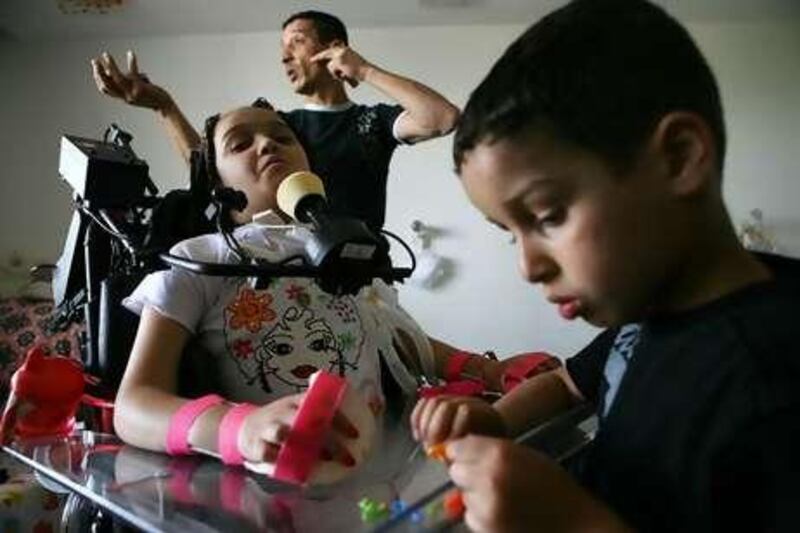Two years after an Israeli missile shattered the body of Maria Aman and nearly took the seven-year-old Palestinian's life, her fate has again become hostage to Israel - this time, in the hands of three judges who are deciding whether she should be transferred to another hospital. Maria was severely wounded in May 2006 when a missile struck the car in which she was travelling, killing her mother, older brother, grandmother and aunt and severing her spine in three places.
Today Maria is paralysed from the neck down. She sits in an electric wheelchair that she controls by moving a joystick with her chin. She has a plastic cowl around her torso to support her body and plastic splints for her hands and feet to protect them because her paralysis means she cannot feel pain. The sole hospital with the facilities to treat her is a children's hospital in West Jerusalem, where she has been living since the missile strike.
Her treatment, which costs about US$20,000 (Dh73,000) per month, has been paid for by Israel's ministry of defence. But now the ministry wants to send Maria and her father, Hamdi, who lives in the ward with her, to a hospital in Ramallah in the occupied West Bank - a move that Maria's family and lawyers say would be tantamount to a death sentence. Palestinian hospitals simply do not have the expensive medical equipment and support staff needed to keep Maria alive, they argue in a case that has reached Israel's supreme court, which yesterday stayed the defence ministry's decision to move Maria out of Alin Hospital.
Her battle, however, is not over. "I just ask for help for my daughter. I want to have some hope for her future," said Mr Aman, who for two years has slept on the floor next to Maria's bed in the ward, astonishing Israeli medical staff with his devotion to his daughter. "The court decided to have a close look at Maria's case. One of the goals was to let Maria stay in Israel, the only place where she can live and survive. It's a matter of life and death," said Adi Lustigman, Maria's lawyer.
"We also asked the state to take responsibility for her exactly as if she had been an Israeli child. We asked the state to take responsibility for all her rehabilitation process," Mr Lustigman said. Maria's struggle began when an Israeli Apache helicopter fired a missile at a car that was alleged to be carrying a member of Islamic Jihad, a militant Palestinian group, in May 2006, striking the target but showering the Aman family's new white Mitsubishi with shrapnel as the car drove past. Maria's 28-year-old mother, Naima, her six-year-old brother, Muhanad, and her grandmother were all killed instantly.
Her three-year-old brother, Muaman, her uncle Nahed and her father were all injured; Nahed later died in hospital in Israel. By the time Maria's father had crawled from the wreckage, his daughter had already been taken to the hospital. She was transferred to a hospital in Tel Aviv, but the Israeli authorities kept Mr Aman waiting for 20 days after the attack before issuing an entry permit. Since arriving in Israel, Mr Aman has slept next to Maria's bed. He bathes her and feeds her and has learnt Hebrew to be able to talk to doctors about Maria's condition. While Maria's treatment is paid for by the Israeli state, he survives only on donations from well-wishers and even sends some of the money he receives back to the Gaza Strip.
"I was flying like a pigeon - I remember it clearly," said Maria, speaking about the missile attack. She has become a novelty in the hospital, where she has charmed a dedicated team of volunteers that visit her in hospital - both Palestinians who are citizens of Israel and Jewish Israelis - and who help collect donations for her and her father. Mr Aman delights his daughter by dressing her up in fancy clothes, often giving her a new hairstyle or putting make-up on her face and painting her nails.
She can recite sections of the Quran by heart and understands Hebrew almost perfectly. She enjoys eating Arabic food from a nearby Lebanese restaurant and wants to go to school. "She is my everything - the queen of the world. I believe in God completely so all this is God's will," he said. "I told Maria the missile was an accident because I didn't want her to develop hatred. But she knows what happened," he said.
* The National





